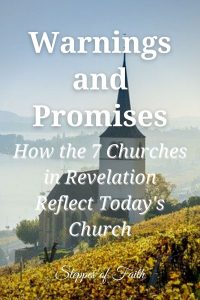
“Hold fast [to] what you have that no one may take your crown.” Revelation 3:11
Life at the end of the first century was in no way easy, especially for the early Christian church. Most of the apostles were dead, the churches were in decline, and Roman persecution of believers was rampant, with many martyred. But one apostle still endured—John.
Despite the oppression, John continued to minister to the churches in Asia Minor (now Turkey) until his arrest in Ephesus by Roman authorities. Instead of the more common sentence of execution, he was exiled to the island of Patmos instead.
It was on Patmos where God gave John a series of visions that prophesied the world’s future history. One of those visions was of the churches where John had ministered. They were beginning to feel the effects of persecution, and their faith was beginning to weaken significantly. Their struggles are why John addressed the first three chapters of the book of Revelation to them. He sought to strengthen them, renew their hope in God’s sovereign control, and warn them against falling away from Him.
Of the seven churches John addressed, six struggled, and only one held fast to following Christ. Their experiences were not much different from churches today. They reflect who we are as believers and how we endure difficult times.
Both then and now, John offers us warnings and promises about what it means to be faithful and the consequences we’ll face if we don’t.
Go Back to Your First Love
After an initial greeting in Revelation 1, John addresses the church of Ephesus in chapter two. Devoted and gifted Christian teachers Priscilla and Aquila likely established the Ephesian church (Acts 18:26). The apostle Paul pastored the church during his third missionary journey (Acts 19), a position he held for about three years.
When Paul moved on, his protégé, Timothy, took over to preach against the false teachings some of the elders were perpetuating. In his first letter to Timothy, Paul noted these false teachers, saying they produced harmful “disputes rather than godly edification (1 Timothy 1:4).”
To help Timothy, Paul wrote a direct letter to the church of Ephesus strongly encouraging and admonishing them to live in a manner worthy of God’s blessings and to reject false teaching. But the teaching persisted, and the church eventually lost its passion for the Gospel. Serving God became mechanical. Their loss of zeal prompted John (through Christ) to send another letter (Revelation) about thirty years later.
In Revelation 2, Christ declares the Ephesian church had forgotten its first love for Him (2:4), so He calls on them to repent.
“Remember therefore from where you have fallen; repent and do the first works, or else I will come to you quickly and remove your lampstand from its place—unless you repent.” (v5)
To remove a lampstand means that God would end the existence of the Ephesian church. God is calling them to repent so they may eat “from the tree of life (v7)”
Many churches around the world have lost their passion for the Gospel. Going to church and serving is just something to do, and practicing the faith means very little. Just as God warned the Ephesian church, He warns us too.
We must go back to our first love. If we hope to eat from the tree of life, we must repent and fall in love with Christ again.

The Church of Smyrna
Smyrna (modern Izmir, Turkey) was considered the crown of Asia. With a large populace of scientists and physicians, the city was fiercely loyal to Rome to the point of cult worship of Caesar. The city also had a large community of Jews who opposed the Christians and even helped put them to death. As a result, the church of Smyrna became known as the persecuted church.
In Revelation 2:8-11, God reminds this church of His protection and love. He tells them He sees their struggles and their “works, tribulation, and poverty (v9),” and He hears the lies the Jews are spreading about them. So, He encourages them not to be afraid because He is always with them. One day, they will be victorious.
“Do not fear any of those things which you are about to suffer. Indeed, the devil is about to throw some of you into prison, that you may be tested, and you will have tribulation ten days. Be faithful until death, and I will give you the crown of life.” (v10)
In this verse, God tells the church their persecution will continue, but only for a little while. In the meantime, they should lean on their faith, professing Christ even if it leads to death. Those who persevere will receive the crown of life.
This crown isn’t like what members of royalty wear. Instead, it is similar to the one an athlete receives after winning competitions such as the Greek games (which we know as the Olympics). It was made of simple leaves, but it carried the great significance of victory over one’s enemy. Paul also used this analogy in 1 Corinthians 9:24-25.
“Do you not know that those who run in a race all run, but one receives the prize? Run in such a way that you may obtain it. And everyone who competes for the prize is temperate in all things. Now they do it to obtain a perishable crown, but we for an imperishable crown.”
We may have resistance or even persecution for our faith, but God encourages us to remain faithful and finish the race of our salvation. Those who succeed will receive the imperishable crown of life.
False Teachers in Pergamos
The city of Pergamos, located near the Aegean Sea, served as the capital of the Roman province of Asia Minor for hundreds of years. It was also a hotbed for pagan cults. It was the first city to build a temple to worship Caesar and a medical school that practiced healings based on superstition (its snake symbol is still the medical symbol used today).
Like the church of Ephesus, the church in Pergamos struggled against false teachers.
Individual members of the church believed in Balaam’s false teachings. Balaam was a man in the Old Testament who had prophetic gifts and faked his faith in God. You might remember how he got a stern talking-to from a certain donkey (Numbers 22:22-35). He commonly promoted sexual immorality and idol worship. He also practiced magic and divination and worked to put a curse on Israel (Numbers 25).
Other members held beliefs in another false teacher named Nicolas. The twelve apostles ordained him as a deacon in Acts 6, but he eventually led the church astray into idol worship, sexual immorality, and self-indulgence, much like Balaam. Revelation 2:6 and 2:15 both mention Nicolaitans, and both times God says He hates them. So, He warns the church in Pergamos to repent, or else He would bring His judgment on them.
“Repent, or else I will come to you quickly and will fight against them with the sword of My mouth.” (v16)

A Ticket to Heaven
False teaching and sexual immorality are still quite prevalent in today’s churches. God in His mercy invites us to repent and restore our relationship with Jesus (what verse 17 calls manna).
He also promises to give us a white stone, another reference to winners of athletic competitions. In addition to a leafy crown, the winner would also receive a white stone with his name on it that acted as an admission ticket to a post-game celebration.
Similarly, the white stone in verse 17 is our pass to heaven to enjoy a victory celebration over sin with the Lord. And on the stone will be written our new name in Christ that only we will be able to see. It will be a very personal message between Jesus and us.
But we cannot receive the stone unless we receive the manna, which is Jesus. We must repent and die daily to ourselves so that God’s righteousness can dwell in us. We can then rightly discern false teaching from the truth of His word. Without God’s saving grace, we never have the hope of a ticket to heaven, but we will have a ticket to hell.
Resist the Devil
The church in Thyatira, largely a Roman military outpost, also struggled with sexual immorality. Evidently, a certain woman whom God refers to as Jezebel from the Old Testament (1 Kings 21:25-26) influenced the church into illicit sexual activity. God encouraged her to repent, but she refused. And so, God promises she and all her children plus anyone who engaged with her would all die (Rev 2:22-23).
But the church wasn’t entirely consumed by this woman’s influence. Many remained faithful to God. As a reward, God said He would not burden them anymore, and He encouraged them to hold tight to their faith. Those who endured would receive divine protection and intimacy with Jesus when He returns to reclaim His kingdom.
Though some people around us love to sin and tempt others to follow, it is essential to resist. We must recognize that these people are instruments of Satan and hold onto God’s promises and commands. The apostle Paul spoke of resisting the devil many times in his writings, and his words of caution always bear repeating.
“For we do not wrestle against flesh and blood, but principalities, against powers, against the rulers of the darkness of this age, against spiritual hosts of wickedness in the heavenly places. Therefore, take up the whole armor of God that you may be able to withstand in the evil day, and having done all, to stand.” Ephesians 6:12-13
The Dead Church
The church of Sardis did not struggle with false teaching or sexual impropriety. Instead, it was completely and utterly void of any passion for the Gospel. According to Revelation 3:1, the church was well-known for its godly works, but the people lacked any real relationship with God, which is why God declared them dead.
Like the previous churches, God exhorts them to repent. If they didn’t, He promised to come upon them “as a thief (v3)” at an unknown hour and judge them accordingly.
Some of the people still maintained a relationship with God. Those are the ones who are promised holy, pure, white garments, their names written forever in the Book of Life, and Jesus’ confession of their names before the Father.
One problem in many churches is the absence of the Holy Spirit. Actively walking with Jesus isn’t always encouraged in tangible ways. What results is a dead church where the people show up once a week, sit for an hour, and go home not having received any encouragement to repent, mature in their faith, or serve others.
If you are involved in such a church, it’s time for a change. God clearly says He will judge us for our complacency. We will not lose our salvation, but our relationship with God will suffer. We will not receive any white garments or stones, or crowns. In other words, we will not experience the fullness of His blessings.
A dead church does nothing but helps our hearts to wither. It is imperative to be in a church that teaches the truth of God’s word. It should encourage its members to share the Good News with others and serve in His kingdom. The Holy Spirit must be present. Otherwise, our relationship with God dies, and we fall away.

Get Off the Fence
Like the church in Sardis, the Laodicean church was also lukewarm if not yet dead. Most of its hypocritical members falsely professed knowing God.
The Lord wastes no time. He declares He will vomit them out of His mouth (v16). He makes this correlation to how visitors spit out the city’s dirty, tepid water from a filthy underground aqueduct. God would much rather the church get off the fence and be either cold or hot. So, once again, He pleads for them to repent.
“As many as I love, I rebuke and chasten. Therefore, be zealous and repent. Behold, I stand at the door and knock. If anyone hears My voice and opens the door, I will come into him and dine with him, and he with Me.” (v19-20)
Though we often think of God standing at the door of our hearts and knocking, this verse shows He was actually talking about the church as a whole and His great desire to enter it. He longed to save them from their spiritual bankruptcy.
Again, God makes a promise. Those who repent will sit with Jesus on His throne. It is a figurative expression that means we will enjoy the same privilege and authority He has when we reign with Him in the new millennium.
God does not want us to be fence riders. We must make a choice—are we going to follow Him or not? He promises He will spit fake Christians out of His mouth, but He doesn’t want to do that. He would much rather give us fruit from the tree of life, white garments and stones, a crown, and a place at His throne out of the abundance of His glory and love.
All we need to do is choose.
The Faithful Church
One church managed to avoid false teaching and the various sins plaguing the other churches. They obeyed the Lord and never hid their faith. The church of Philadelphia was faithful to God, and it is the only one that found favor with Him.
Likely founded by Paul, the church of Philadelphia persisted despite Jewish accusations and Roman persecution, and surely there was a lot of it. Located on the Imperial Post Road, a major Roman trade route in Asia Minor, Philadelphia experienced many visitors and soldiers, many not very friendly to Christians.

Map of the Imperial Post Road in Asia Minor
Yet, the church thrived, and it did not escape God’s notice. As a reward, God makes several promises. Big ones.
“Because you have kept My command to persevere, I also will keep you from the hour of trial which shall come upon the whole world, to test those who dwell on the earth…He who overcomes, I will make him a pillar in the temple of My God, and he shall go out no more. I will write on him the name of My God and the name of the city of My God, the New Jerusalem, which comes down out of heaven from My God. And I will write on him My new name.” (Revelation 3:10-12)
God’s promises to the church of Philadelphia are the same promises we can claim today. If we can remain faithful and obedient to Him, He will spare us (i.e., rapture us) before the dreadful tribulation and the Day of the Lord when Jesus brings His divine judgment. He will also provide an eternally secure place in His presence, claim us as His own, and reveal His full glory to us.
We can be sure by the inerrancy of His word that the Lord’s promises are always dependable and true.

Hold Fast
Not all churches are the same. Each one has its set of issues, from adultery to pornography, false teaching to addiction, and much more. Not much has changed, which is why God repeatedly pleads with us to repent. His salvation is available to anyone who wants it, but only if we surrender to Him, turn away from sin, and obey His word.
In each of these addresses to the different churches, God, again and again, promises us victory and a special invitation to stay in His presence forever if we can endure the hard times. He also promises to those who resist, give up, or stay lukewarm that they will face His righteous judgment and potential banishment to eternal destruction.
We must run the race, press toward the mark, and never give up on God. His love is eternal. He is faithful to the end. His desire to be with us is overwhelming. But we must repent and choose to follow Him first.
It’s time for the church to face the truth. The Lord will return to judge the world, and He promises He will do it quickly. We need to be ready. How we live out our Christian faith matters. Believers should heed the Lord’s words in Revelation 3:11.
“Hold fast [to] what you have that no one may take your crown.”

“medical school that practiced healings based on superstition (its snake symbol is still the medical symbol used today)” The medical symbol with the snake mounted on a stick/ staff is from when Moses lifted the serpent in the desert Numbers 21:9 what makes you think it’s from Pergamos?
Why do you think it is based on Moses? The bronze serpent you’re referring was a foreshadow of Jesus. The serpent not only healed the people, it also commanded the people’s obedience if they wished to live. In Pergamos, a major Roman city, the satanic practices of the time included worship of Asklepios, the god of healing. The snake-like form is based on his perceived likeness. The medical school at the time dabbled in superstition with one practice being of laying on the temple floor and allowing snakes to crawl over a person so he might receive its healing power. Snakes were a very popular symbol of the city of Pergamos.